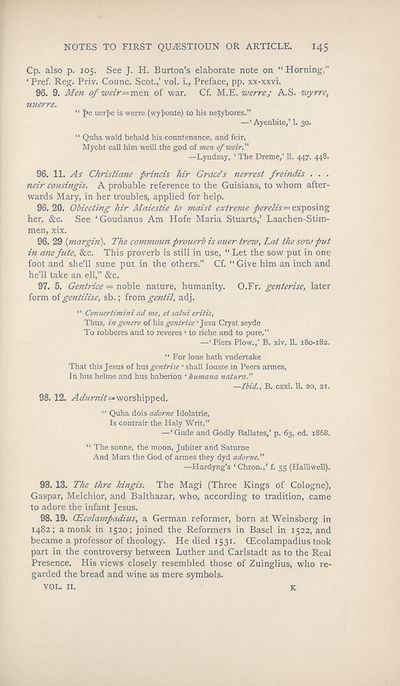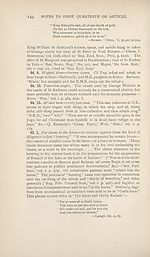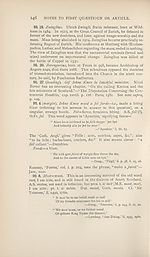Scottish Text Society publications > Old series > Certain tractates > Volume 2, 1890
(187) Page 145
Download files
Complete book:
Individual page:
Thumbnail gallery: Grid view | List view

NOTES TO FIRST QEOESTIOUN OR ARTICLE. I45
Cp. also p. 105. See J. H. Burton’s elaborate note on “ Horning,”
‘ Pref. Reg. Priv. Counc. Scot.,’ vol. L, Preface, pp. xx-xxvi.
96. 9. Men of weir^ men of war. Cf. M.E. -werre; A.S. luyrre,
uuerre.
" pe uer)>e is werre (wy|>oute) to his nejybores.”
—‘ Ayenbite,’ 1. 30.
“ Quha wald behald his countenance, and feir,
Mycht call him weill the god of men of weir.”
—Lyndsay, ‘ The Dreme,’ 11. 447, 448.
96. 11. As Christiane princis hir Grace's nerrest freindis . . .
neir cousingis. A probable reference to the Guisians, to whom after¬
wards Mary, in her troubles, applied for help.
96. 20. Obiecting hir Maiestie to maist extreme yVn?/z'.r = exposing
her, &c. See ‘ Goudanus Am Hofe Maria Stuarts,’ Laachen-Stim-
men, xix.
96. 29 (margin). The commoun prouerb is ouer trew, Lat the sow put
in ane fute, &c. This proverb is still in use, “ Let the sow put in one
foot and she’ll sune put in the others.” Cf. “ Give him an inch and
he’ll take an ell,” &c.
97. 5. Gentrice = noble nature, humanity. O.Fr. genterise, later
form of gentilise, sb.; from gentil, adj.
“ Conuertimini ad me, et salui eritis,
Thus, in genere of his gentrice ■ Jesu Cryst seyde
To robberes and to reveres • to riche and to pore."
—‘Piers Plow.,' B. xiv. 11. 180-182.
“ For loue hath vndertake
That this Jesus of hus gentrise • shall louste in Peers armes,
In hus helme and hus haberion • humana natura.”
—Ibid., B. cxxi. 11. 20, 21.
98. 12. Adurnit^-worshipped.
“ Quha dois adorne Idolatrie,
Is contrair the Haly Writ.”
—‘ Gude and Godly Ballates,’ p. 63, ed. 1868.
“ The sonne, the moon, Jubiter and Saturne
And Mars the God of armes they dyd adorne.”
—Hardyng’s ‘Chron.,’ f. 55 (Halliwell).
98. 13. The thre kingis. The Magi (Three Kings of Cologne),
Caspar, Melchior, and Balthazar, who, according to tradition, came
to adore the infant Jesus.
98. 19. CEcolampadius, a German reformer, born at Weinsberg in
1482; a monk in 1520; joined the Reformers in Basel in 1522, and
became a professor of theology. He died 1531. Gicolampadius took
part in the controversy between Luther and Carlstadt as to the Real
Presence. His views closely resembled those of Zuinglius, who re¬
garded the bread and wine as mere symbols.
VOL. II.
K
Cp. also p. 105. See J. H. Burton’s elaborate note on “ Horning,”
‘ Pref. Reg. Priv. Counc. Scot.,’ vol. L, Preface, pp. xx-xxvi.
96. 9. Men of weir^ men of war. Cf. M.E. -werre; A.S. luyrre,
uuerre.
" pe uer)>e is werre (wy|>oute) to his nejybores.”
—‘ Ayenbite,’ 1. 30.
“ Quha wald behald his countenance, and feir,
Mycht call him weill the god of men of weir.”
—Lyndsay, ‘ The Dreme,’ 11. 447, 448.
96. 11. As Christiane princis hir Grace's nerrest freindis . . .
neir cousingis. A probable reference to the Guisians, to whom after¬
wards Mary, in her troubles, applied for help.
96. 20. Obiecting hir Maiestie to maist extreme yVn?/z'.r = exposing
her, &c. See ‘ Goudanus Am Hofe Maria Stuarts,’ Laachen-Stim-
men, xix.
96. 29 (margin). The commoun prouerb is ouer trew, Lat the sow put
in ane fute, &c. This proverb is still in use, “ Let the sow put in one
foot and she’ll sune put in the others.” Cf. “ Give him an inch and
he’ll take an ell,” &c.
97. 5. Gentrice = noble nature, humanity. O.Fr. genterise, later
form of gentilise, sb.; from gentil, adj.
“ Conuertimini ad me, et salui eritis,
Thus, in genere of his gentrice ■ Jesu Cryst seyde
To robberes and to reveres • to riche and to pore."
—‘Piers Plow.,' B. xiv. 11. 180-182.
“ For loue hath vndertake
That this Jesus of hus gentrise • shall louste in Peers armes,
In hus helme and hus haberion • humana natura.”
—Ibid., B. cxxi. 11. 20, 21.
98. 12. Adurnit^-worshipped.
“ Quha dois adorne Idolatrie,
Is contrair the Haly Writ.”
—‘ Gude and Godly Ballates,’ p. 63, ed. 1868.
“ The sonne, the moon, Jubiter and Saturne
And Mars the God of armes they dyd adorne.”
—Hardyng’s ‘Chron.,’ f. 55 (Halliwell).
98. 13. The thre kingis. The Magi (Three Kings of Cologne),
Caspar, Melchior, and Balthazar, who, according to tradition, came
to adore the infant Jesus.
98. 19. CEcolampadius, a German reformer, born at Weinsberg in
1482; a monk in 1520; joined the Reformers in Basel in 1522, and
became a professor of theology. He died 1531. Gicolampadius took
part in the controversy between Luther and Carlstadt as to the Real
Presence. His views closely resembled those of Zuinglius, who re¬
garded the bread and wine as mere symbols.
VOL. II.
K
Set display mode to: Large image | Zoom image | Transcription
Images and transcriptions on this page, including medium image downloads, may be used under the Creative Commons Attribution 4.0 International Licence unless otherwise stated. ![]()
| Publications by Scottish clubs > Scottish Text Society publications > Old series > Certain tractates > Volume 2, 1890 > (187) Page 145 |
|---|
| Permanent URL | https://digital.nls.uk/107433731 |
|---|
| Attribution and copyright: |
|
|---|
| Description | A collection of over 100 Scottish texts dating from around 1400 to 1700. Most titles are in Scots, and include editions of poetry, drama, and prose by major Scottish writers such as John Barbour, William Dunbar, Gavin Douglas, and George Buchanan. Edited by a key scholarly publisher of Scotland's literary history, and published from the late 19th century onwards by the Scottish Text Society. Available here are STS series 1-3. |
|---|

